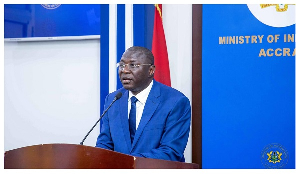Economic planning is the lifeblood of national development; a mechanism to shape a nation’s destiny, align its resources with aspirations, and create a sustainable legacy for future generations.
Yet, when economic planning is housed under the Ministry of Finance, its potential is diminished by the gravitational pull of short-term fiscal priorities and reactive decision-making. This conflict has led to a legacy of stagnation, wasted opportunities, and unfulfilled promises.
The consequences are glaring: stalled infrastructure, abandoned industrialization projects, and the erosion of public trust.
The situation becomes even more dire under the influence of International Monetary Fund (IMF) programs, which often prioritize fiscal stabilization over meaningful, long-term economic growth. These failures are not merely systemic flaws; they are a profound betrayal of the developmental aspirations of nations and their people.
But amidst this sobering reality lies an undeniable opportunity; a chance to rethink, rebuild, and reclaim the future through bold leadership and forward-thinking strategies.
The core conflict – where vision collides with fiscal realities
Short-term stability vs. Long-term growth
The Ministry of Finance prioritizes balancing budgets, managing deficits, and ensuring liquidity. While these goals are essential for fiscal health, they often overshadow the transformative investments needed for industrialization, infrastructure development, and education. It is as if a farmer plants only crops for the next season, feeding his family for a year, while neglecting to plant trees that could feed generations.
For example, rail and renewable energy projects; both of which demand high initial costs but yield immense long-term benefits, are often sacrificed in favor of immediate cost-cutting measures. These short-term choices perpetuate stagnation, preventing nations from laying the foundations for sustained economic prosperity.
Reactive vs. Proactive approaches
Finance ministries, by their very nature, are reactive. They address fiscal crises, revenue shortfalls, or economic shocks with immediate solutions. However, economic planning demands foresight. Without it, a nation becomes like a sailor navigating a storm without a map; adrift, vulnerable, and destined to crash against the rocks.
Effective planning requires anticipating demographic shifts, global trends, and technological advancements. This forward-looking vision often becomes lost when economic planning is subordinated to fiscal priorities, leaving nations ill-prepared for the challenges ahead.
The IMF: balancing books, not building economies
The IMF is often seen as a lifeline for struggling economies, but its focus is on fiscal stabilization, not economic transformation. It prioritizes balancing budgets and reducing deficits, frequently at the expense of essential development spending. A nation that trades its sovereignty for financial survival risks finding itself with neither.
IMF programmes rarely prioritize investments in industrialization, infrastructure, or social development; areas critical for long-term growth. This neglect leaves nations unable to pursue their own aspirations.
For instance, Nigeria’s Ajaokuta Steel Complex, once envisioned as a cornerstone of industrialization, was left incomplete due to IMF-imposed funding cuts. Similarly, Ghana’s state-owned factories and Sudan’s Gezira irrigation scheme were abandoned under IMF structural adjustment programs, halting their potential for economic transformation.
These examples highlight a harsh reality: balancing the books without building the house leaves families exposed to the elements, with no shelter from the storms of economic hardship.
The consequences are stark
Stalled development
Ambitious projects such as industrial parks, energy grids, and railways often remain incomplete under finance-driven planning. Railways, in particular, are critical for industrialization and economic equity, yet they remain neglected in many nations.
Railways are the arteries of industrial economies, connecting factories to markets, reducing transportation costs, and fostering regional integration. Without them, industrial hubs cannot thrive, and the economy struggles to circulate its wealth. It is akin to a body without arteries; no matter how much it produces, it cannot distribute resources efficiently.
For instance, many nations rich in agricultural and mineral resources fail to reach global markets because of inadequate rail infrastructure. This lack of connectivity not only stifles industrial growth but also marginalizes rural communities that could otherwise benefit from economic opportunities.
Missed opportunities
By neglecting strategic investments in railways, manufacturing hubs, and renewable energy, nations forfeit the economic multipliers that drive industrialization, global competitiveness, and regional integration. Every missed opportunity becomes a gift for nations that dare to act boldly and invest in their future.
Erosion of public trust
When governments announce bold projects only to abandon or underfund them, public trust erodes. Trust, once broken, is like shattered glass; the pieces may be gathered, but the cracks remain visible. This loss of faith weakens institutions and perpetuates cycles of underdevelopment.
The path forward – bold leadership and visionary transformation
Establish independent, well-funded planning institutions
Economic planning must be separated from fiscal management. Autonomous planning bodies, free from political interference and short-term pressures, can prioritize transformative goals such as industrialization and infrastructure development. Without structure, vision is nothing more than a dream; it collapses under the weight of reality.
Adopt multidisciplinary collaboration
Economic planning must integrate insights from diverse fields: urban planning, industrial policy, education, and environmental science. The most innovative solutions are born when diverse minds converge on a common goal, combining their expertise to tackle complex challenges.
Innovate financing models
To move beyond IMF dependence, nations must explore public-private partnerships, sovereign wealth funds, and diaspora bonds to finance long-term projects. A nation that controls its purse strings controls its destiny, and self-reliance is the cornerstone of true sovereignty.
Insulate plans from political cycles
Long-term projects must be protected from the volatility of political transitions. Legislative protections can ensure that transformative initiatives endure beyond the lifespan of any one administration. A tree that survives storms is one whose roots are deeply anchored in the soil of purpose.
A reflection and a call to action
The failures of finance-driven economic planning and IMF-enforced austerity are stark reminders of the cost of neglecting long-term growth. These failures represent lost opportunities, but they also highlight the potential for bold, transformative change.
It is time for African and other developing nations to abandon outdated governance models that no longer serve their unique needs. A nation that borrows another’s framework borrows its limitations. African governments, in particular, must stop blindly adopting foreign systems and instead adapt strategies that align with their realities.
Repetition of the same steps will only lead to the same destination. It takes a new path to find a new horizon. The future will reward those who dare to carve their own way. Let the leaders of today rise to the challenge and become architects of a brighter tomorrow.
The river that dares to carve its own path not only flows the farthest. It shapes the land it flows through. Let this moment mark the beginning of bold action, where hesitation gives way to transformation, and vision triumphs over inertia.
Watch the latest edition of BizTech below:
Click here to follow the GhanaWeb Business WhatsApp channel
Click to view details



Business News of Saturday, 21 December 2024
Source: thebftonline.com

















